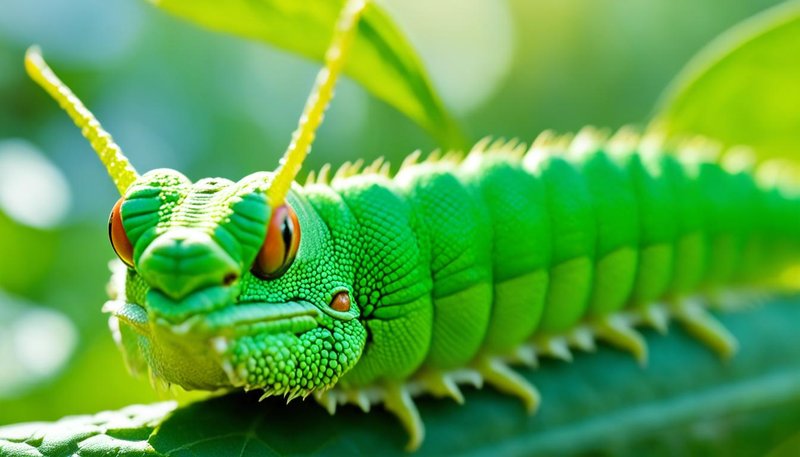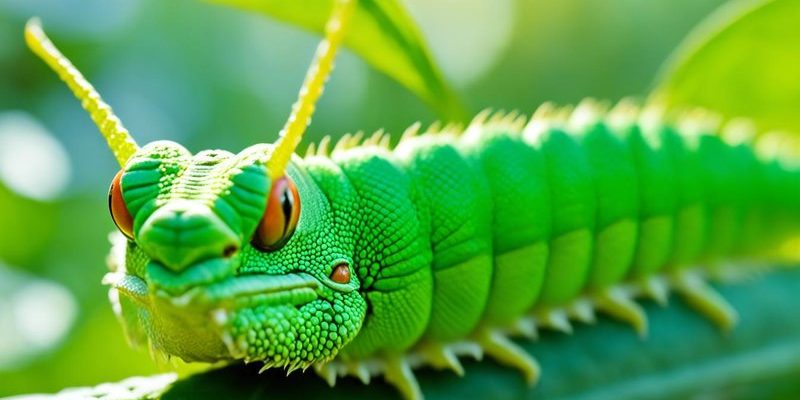
Now, when I talk about hornworms, I’m referring to the larvae of the Five-spotted Hawkmoth. These juicy little guys are not only a feast for your reptile but can also help keep their diet varied and exciting. You might be wondering, “Are they suitable for all reptiles?” or “What benefits do they bring?” Let’s dive into the world of hornworms and figure out if they’re worth adding to your pet’s menu!
What Are Hornworms?
Hornworms are bright green caterpillars that can grow quite large—up to four inches long! They may look a tad intimidating, but trust me, your reptile will see them as a tasty treat. These larvae primarily feed on tomato and tobacco plants, which is why they can sometimes be tricky to find. They thrive on a diet rich in leaves, which helps them give off that lush, vibrant color.
Feeding hornworms to your reptile can be similar to how we enjoy adding a splash of color to our meals. They’re moist, soft-bodied, and have a subtle flavor that many reptiles can’t resist. That said, as with any food, keeping a balanced diet for your pet is vital. You wouldn’t just eat dessert every day, right? Similarly, hornworms should be a part of a varied diet.
Benefits of Using Hornworms as Reptile Feed
Hornworms come with a handful of benefits that make them an appealing option for reptile owners. First, they are incredibly nutritious. Packed with **protein**, **calcium**, and **moisture**, they can help your pet grow strong and healthy. Plus, the moisture content can help keep them hydrated, which is especially beneficial in hotter climates.
Here’s the thing: some reptiles can be picky eaters. You might have a dragon that turns up its nose at its regular meals. Introducing hornworms can provide a new texture and taste that sparks their interest. It’s like surprising your friend with their favorite dish on a dull day; they’ll be excited for the change!
Another benefit is that hornworms are low in fat, making them a great option for reptiles that need to maintain a healthy weight. So, if you’re worried about your pet getting too chubby, hornworms can be a smart choice.
Are Hornworms Safe for All Reptiles?
While hornworms generally make a fantastic snack, not all reptiles will have the same reaction. It’s important to consider the specific dietary needs of your pet. For instance, most species of **bearded dragons**, **geckos**, and **chameleons** can safely munch on hornworms without a problem. However, certain reptiles that require a more specialized diet may not find hornworms as beneficial.
When introducing hornworms, start with just a few to see how your reptile reacts. Observe if they enjoy them and whether their digestive system handles the new addition well. If your reptile is particularly sensitive, it’s wise to consult with a veterinarian before making hornworms a staple in their diet.
How to Feed Hornworms to Your Reptile
Feeding hornworms to your pet is pretty straightforward, but there are some tips to make the experience smooth for both you and your reptile. First, you want to ensure that the hornworms are the right size. A good rule of thumb is to choose worms that are about the size of your reptile’s head.
Next, you can offer them directly in your pet’s habitat or place them in a feeding bowl. Unlike other insects, hornworms are slow-moving, so your reptile will have an easier time catching them. If you notice your pet seems uninterested, try gently moving the hornworm around to catch their attention. It’s a little like waving a snack in front of your friend to lure them to the dinner table!
Lastly, it’s essential to source your hornworms from a reputable supplier. You don’t want to take chances with your pet’s health, so always ensure the worms have been raised safely and without harmful chemicals.
Alternatives to Hornworms
If hornworms aren’t available or don’t seem like the right fit for your reptile, there are plenty of alternatives. **Dubia roaches** and **black soldier fly larvae** are other nutritious options that offer various benefits. They’re also easily digestible and can be found in most pet stores.
Mealworms and crickets are also popular choices. They might not have the same nutritional profile as hornworms, but they provide good protein sources and are often more readily available. When choosing alternatives, consider your reptile’s preference and dietary needs to ensure they stay healthy and happy.
In the end, hornworms can be a unique and healthy addition to your reptile’s diet. They’re packed with nutrients, can entice picky eaters, and add a fun twist to their meals. Make sure to monitor how your reptile responds to these tasty treats, and don’t hesitate to mix things up with other meal options as well.
Remember, the key to a happy, healthy reptile is a balanced diet. So, whether your pet thrives on hornworms or prefers something else, keeping their diet varied will always be a winning strategy. Happy feeding!

